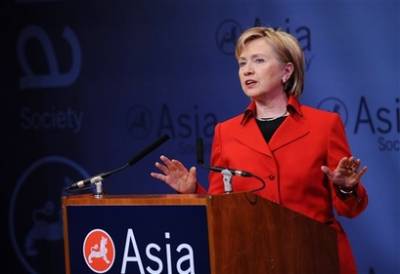
WASHINGTON – Hillary Rodham Clinton's first trip abroad as President Barack Obama's chief diplomat will emphasize the administration's interest in Asia while probably producing no major policy changes.
Previous secretaries of state have traveled first to Europe or the Middle East. For Clinton, who departs Sunday for Japan, Indonesia, South Korea and China, her tour is a symbolic gesture aimed at reassuring friends and allies of their standing and impressing the Chinese with early engagement.
"It is important to signal that we intend to develop broader and deeper relationships not only with the countries that I'll be visiting but with other nations throughout Asia and the Pacific," she told reporters in a conference call ahead of her trip. "We believe that our futures are inextricably linked."
At the Asia Society in New York on Friday, Clinton spoke of wanting "more rigorous and persistent commitment and engagement" with the region. For talks with leaders in each capital, she is bringing a sheaf of global issues, including the financial crisis and climate change.
Efforts to convince North Korea to abandon its nuclear weapons are an important part of her agenda in Tokyo, Seoul and Beijing, where concern is high over recent saber-rattling from the North.
Her talking points will touch on human rights concerns in China and Indonesia, where Obama spent part of his childhood. He hopes to visit Indonesia early on in his presidency. Other items for Clinton include clean energy, organized crime, human trafficking and the threat of pandemic disease such as bird flu.
While Obama's national security team continues wide-ranging reviews on most aspects of foreign policy, Clinton's hosts probably will not see any substantial shifts from the Bush administration, although they may detect a change in emphasis.
The Obama administration is looking to reshape the past approach to Beijing, broadening and deepening relations with an eye toward economics and dealing with carbon emissions that contribute to global warming. The administration wants to reinforce traditional alliances with Japan and South Korea, which host thousands of American troops, as the bedrock of Asia-Pacific security.
Clinton intends to sign an agreement in Japan that will see 8,000 Marines now stationed in Okinawa relocate to Guam and will commit the Japanese government to helping pay for further realignment of U.S. forces, officials said. In Indonesia, she plans to announce an upgrade in U.S. relations with the Association of Southeast Asian Nations, a regional grouping that often felt slighted during the Bush administration.
Accompanying her will be her new special envoy for climate change, Todd Stern, a former White House assistant who was the chief U.S. negotiator at the Kyoto Protocol talks in President Bill Clinton's administration. Stern will have a major role in her talks in China, one of the world's largest emitters of greenhouse gas.
"The U.S. is clearly going to put a lot of emphasis on climate in the overall relationship with China," said Michael Green, a former National Security Council official. Clinton plans to visit to a thermal energy plant near Beijing.
Green and others noted that the financial crisis would also play a major part in Clinton's discussions, especially in Japan and China, the wealthiest nations on her itinerary. China has invested billions in U.S. markets and bonds and its financial commitment and openness to imports will be critical to jump-starting the American economy.
"What we really want to get out of the Chinese at this point is assurances that their markets are going to continue to open and that trade will continue to progress," said Elizabeth Economy, a scholar at the Council on Foreign Relations.
On the region's major security challenge, North Korea's nuclear programs, Clinton said the Obama team would not change course from the Bush administration. She is expected soon to name a special envoy to negotiate with the North in now stalled six-nation talks that include China, Japan, Russia and South Korea.
"We believe we have an opportunity to move these discussions forward," she said. "But it is incumbent on North Korea to avoid any provocative action and unhelpful rhetoric toward South Korea."
North Korea recently adopted a more belligerent tone. But Clinton stressed that "if North Korea is genuinely prepared to completely and verifiably eliminate their nuclear weapons program, the Obama administration will be willing to normalize bilateral relations."
Clinton said she wants to "replace the peninsula's long-standing armistice agreement with a permanent peace treaty" and provide energy and other economic aid to North Koreans.
That carrot-and-stick approach did not produce the desired result for the Bush administration. Bush's State Department angered Japan last year by removing North Korea from its list of state sponsors of terrorism without addressing Tokyo's concerns about the fate of Japanese citizens abducted by the North.
In a bid to ease Japan's anxiety, Clinton plans meetings in Tokyo not only with Japanese officials, but with the families of some of the abuctees.
"I cannot imagine what it must feel like to have lost family members and, for so many years, never to have heard anything about them or from them," she told reporters. "It's important that their plight not be forgotten."
___
On the Net:
State Department: http://www.state.gov/
|



